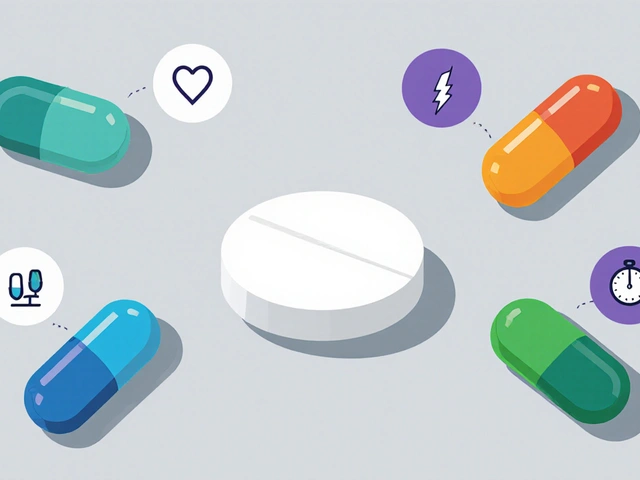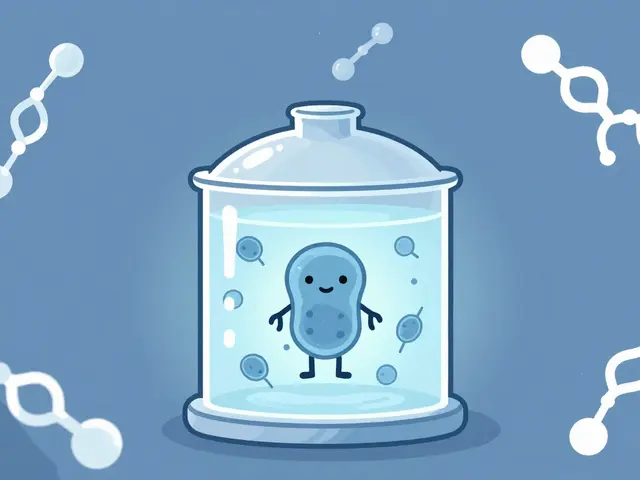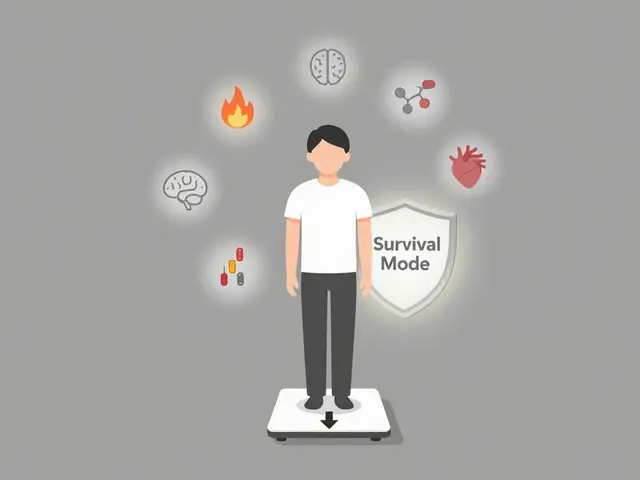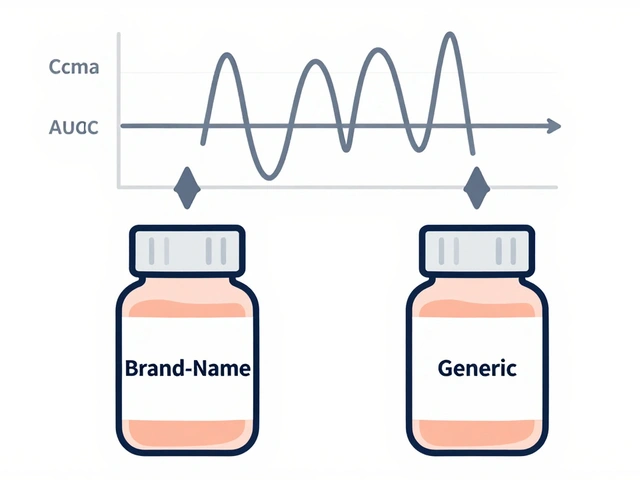Cystic fibrosis (CF) isn't just a term tossed around by doctors; it's a part of everyday life for thousands. At its core, CF is a genetic condition that clogs the body's ducts with thick, sticky mucus. This mainly hits the lungs and digestive system, but honestly, it can mess with a lot more. The key to managing it? Knowing what you're up against.
Today's strides in medical research mean CF patients have more hope than ever before. Once upon a time, living to adulthood with CF was a stretch. Now, thanks to breakthroughs in treatment and early detection, many individuals are living long enough to frown at grey hairs. But how long is 'long enough' exactly? Well, it's not one-size-fits-all—several factors come into play, like genetics, adherence to treatment, and even socioeconomic status.
Let's talk numbers: life expectancy for folks with CF is on the rise, reaching into the 40s and beyond, depending on various factors. This isn’t just about statistics; it’s about real people living real lives. With a solid medical team by your side and sticking to treatment plans, there’s room for a bright future—even with CF.
- What is Cystic Fibrosis?
- Current Life Expectancy Trends
- Factors Influencing Prognosis
- Tips for Managing Health
- The Future of CF Treatment
What is Cystic Fibrosis?
At its core, cystic fibrosis is a serious genetic disorder that messes with the body’s ducts, primarily hitting the lungs and digestive system with some gooey, sticky mucus. Basically, it screws up the cells that produce sweat, mucus, and digestive juices. This thick gunk clogs things up, especially in the lungs and digestive tract, making breathing a chore and messing with digestion.
So, what's going on at a genetic level? CF is caused by mutations in the CFTR gene. This gene is like a blueprint for making a protein that controls the flow of salt and fluids in and out of your cells. When something goes haywire with this blueprint, the result is that annoying, thick mucus. You inherit CF when both parents pass down a defective copy of this gene.
How Common is It?
While cystic fibrosis might sound rare, it's actually one of the most common life-shortening genetic diseases. It impacts roughly 1 in 2,500 to 3,500 newborns in the United States. In Australia, similar numbers mean about one in every 2,500 babies is diagnosed, making it crucial to understand and manage.
Signs and Symptoms
Alright, how does someone know they have CF? Symptoms can be subtle or striking, and they vary from person to person. Common signs include:
- Persistent coughing, often with thick mucus
- Frequent lung infections
- Wheezing or shortness of breath
- Poor growth or weight gain, despite a good appetite
- Greasy, bulky stools
- Salty-tasting skin—some parents notice this when kissing their babies
Diagnosing CF early is a game-changer. Most countries now screen newborns, catching cases before symptoms go wild. A sweat test is the gold standard for diagnosis, where the salt content in sweat is measured, giving a clear yes or no for CF.
Tackling the Symptoms
Living with CF is like running a marathon with hurdles. But with the right treatments, life can be managed better. Treatment focuses on things like loosening and clearing lung mucus and managing nutrition. Medicines, physical therapy, and sometimes even load of antibiotics are in the toolkit for tackling this condition.
Current Life Expectancy Trends
Cystic fibrosis has come a long way from being an all-too-often deadly diagnosis in childhood. These days, thanks to massive leaps in medical science, people diagnosed with cystic fibrosis are living longer and healthier lives than ever before.
So, what's the deal with life expectancy now? Well, the numbers keep getting better. In the 1980s, it wasn't uncommon for CF patients to barely see life beyond their teens. Fast forward to today, and the projected median life expectancy is extending into the 40s. Some folks are even breaking the 50-year mark, which wasn't even on the radar a few decades ago.
The Role of New Treatments
One of the biggest game changers has been the introduction of CFTR modulators. These fancy-sounding drugs have been a complete 180 for CF care, specifically targeting the defective protein at the heart of the disease. With these treatments, many people experience a significant improvement in lung function and overall health, which directly affects how long they might live.
Not everybody gets the same results, though. It depends on the specific genetic mutations they have, and unfortunately, these treatments aren't a cure-all. Yet, it's a promising start, and new therapies are constantly under development to cater to an even wider range of patients.
Beyond Medication: Lifestyle and Support
It's not just about popping pills, though. Your lifestyle plays a huge part. A balanced diet, regular exercise, and diligent airway clearance techniques all add up to big benefits for those with CF.
Prognosis isn't just a waiting game anymore. Today, with better resources and community support, people with CF are in a much better position to plan their futures. It's important to stay informed about new research and participate in CF care opportunities tailored to individual needs.

Factors Influencing Prognosis
When it comes to understanding how cystic fibrosis (CF) affects life expectancy, we've got to dig into the nitty-gritty. Not just one thing defines your prognosis—it's more of a mix of several elements.
Genetics and Mutations
First up, the genetic side. CF starts with a mutation in the CFTR gene, and there are over 1,700 known mutations. Some mutations might lead to a more severe form of CF, while others may result in milder symptoms. If you've got a rarer mutation, it can affect how effectively treatments work and the overall outlook.
Access to Healthcare
Timely and effective care is another major player in the prognosis game. Regular check-ups and access to specialized CF centers can make a world of difference. Missing out on medical advances or treatments because of location or financial limits isn't just frustrating—it can impact everything from symptom management to complications.
Lifestyle and Treatment Adherence
Living with CF isn’t just about the genes you’re born with. It's also about how you manage it. Sticking to a treatment plan, like taking meds and at-home therapies seriously, can lead to fewer hospital stays and better overall health. This means following through with inhalers, chest physiotherapy, and nutritional plans—yep, the whole shebang.
Socioeconomic Status
It's a sad reality, but money matters. Families with fewer resources can find it tougher to access top-notch care or afford cutting-edge treatments. This impacts prognosis more than you might think.
Infections and Complications
Bacterial infections in the lungs are pretty common in CF and can really mess with the outlook. Regular infections can cause lung damage, which hits hard on life expectancy. Keeping infections at bay is key.
The CF Foundation Patient Registry has pulled together some eye-opening numbers:
| Year | Median Age of Survival |
|---|---|
| 2010 | 36 years |
| 2024 | 47 years |
These stats highlight the progress in treatment options available today. The more we know about CF and the better treatments get, the brighter the future looks for those living with it.
Tips for Managing Health
Living with cystic fibrosis might feel like a full-time gig at times, but having a plan makes a world of difference. These tips can help keep you or your loved one on track and boost that quality of life.
Keep Up with Your Meds
First things first: medication is like gold for people with CF. From pancreatic enzymes to help with digestion, to nebuliser treatments that keep your lungs clear, sticking to a medication schedule is key. Make sure to chat with your doctor about anything new that pops up.
Nutritional Know-How
Eating right isn't just about the waistline. Those with CF need extra calories because their bodies work overtime. Think of it as fuel for the fight against this condition. Don't skimp on healthy fats and proteins. A nutritionist familiar with CF can be super helpful here.
Stay Active
Exercise might be the last thing you feel like doing, but it's a game-changer for lung function and overall strength. Whether it's a brisk walk, swimming laps, or even dancing around the living room, staying active is worth the effort.
Frequent Check-Ups
Regular check-ups can catch problems before they become major issues. Your healthcare provider is your partner in all this, so trust the team that knows the ins and outs of CF care.
Access to Specialized Care
Connect with a specialist who knows CF care inside out. They'll keep you updated on the latest treatments and modifications to your routine. Staying in the loop could mean hearing about a new therapy that's a perfect fit.
Peer Support Networks
Having a support system is critical. Joining CF groups either online or in person can provide encouragement, tips, and a place to share both wins and worries. You're not alone in this journey.
Juggling becomes doable with a mix of good habits and a reliable support network. Remember, these adjustments aren't just crucial—they're empowering.

The Future of CF Treatment
The future looks quite promising for cystic fibrosis treatment. Scientists are working hard to develop new therapies to extend life expectancy even further. A big game-changer has been the introduction of CFTR modulators. These drugs target the faulty protein caused by the genetic mutation in CF patients, improving lung function and overall health. Unlike older treatments that focused on symptoms, these new medications get to the root cause of the problem.
Gene therapy is another exciting area. Imagine a world where we can correct the CF gene mutation itself. Researchers are optimistic, exploring ways to insert healthy copies of the gene into patients' bodies. While it's still early days, the potential is massive.
Personalized Medicine
One size doesn’t fit all. That's why personalized medicine is becoming a buzzword in CF circles. Thanks to advances in genetics, doctors can tailor treatments to a person's specific genetic makeup. This means better outcomes and fewer side effects. Who wouldn’t want that?
New Drugs in the Pipeline
Drug companies aren’t resting either. Some new drugs are in clinical trials right now. These aim to tackle infections and inflammation, which are major concerns for CF patients. If they prove effective, they could make hospital visits less frequent and give patients a better quality of life.
| Year | New Developments | Impact Area |
|---|---|---|
| 2025 | New CFTR Modulators Released | Lung Function |
| 2026 | First Gene Therapy Trials | Genetic Repair |
| 2027 | Personalized Medicine Advances | Treatment Customization |
As new treatments emerge, the goal is to turn CF into a manageable condition, much like diabetes. With continued investment and effort, the day might come when living with CF means simply taking a few pills a day rather than juggling a complex treatment routine.







Karla Luis
February 14, 2025 AT 00:35Also who wrote this? It reads like a pharma ad with a thesaurus.
jon sanctus
February 15, 2025 AT 15:35Kenneth Narvaez
February 16, 2025 AT 17:36Christian Mutti
February 18, 2025 AT 05:05Liliana Lawrence
February 18, 2025 AT 09:34Sharmita Datta
February 18, 2025 AT 23:25mona gabriel
February 20, 2025 AT 19:23Phillip Gerringer
February 21, 2025 AT 03:33jeff melvin
February 21, 2025 AT 23:50Matt Webster
February 22, 2025 AT 06:46Stephen Wark
February 24, 2025 AT 00:44Daniel McKnight
February 24, 2025 AT 21:40Jaylen Baker
February 26, 2025 AT 10:42Fiona Hoxhaj
February 27, 2025 AT 23:19Merlin Maria
March 1, 2025 AT 14:16Nagamani Thaviti
March 3, 2025 AT 11:58Kamal Virk
March 4, 2025 AT 15:34Hamza Asghar
March 6, 2025 AT 03:27Elizabeth Grant
March 8, 2025 AT 02:22